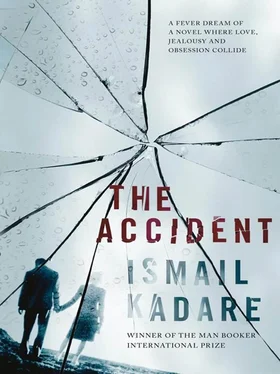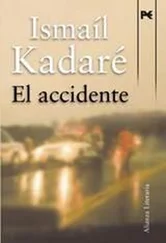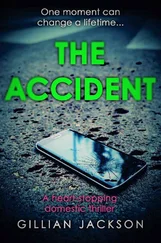For the whole time, almost fifty hours, that they had spent together in Luxembourg they had talked of nothing else. As she listened her eyes became ever sadder. Her objections grew weaker from exhaustion. The dead are also always together. He said no, a thousand times no. They would be free like at the creation of the world. Free, meaning no longer separable. Free to meet if they wanted. To get tired of each other. To forget each other and find each other again. They would experience the revival of desire as no one had ever done before. Whenever they saw each other, they would be strangers, but familiar, as if they had seen each other in dreams. More or less like the time after the episode with Liza, but with a thousand times more power. She should trust him and not harbour dark thoughts as she had done the night before, when she suspected that he was treating her like a call girl or high-class hooker in order to humiliate her, and so, when the time came, to get rid of her more easily. No, he swore he had always wanted the very opposite, to turn her into an icon.
As he talked, her gaze gradually grew pained, insistent, as if she were trying to ask him, Darling, who infected you with this sickness?
Outside, after a lull, the blizzard raged again. A passenger entered the compartment, lurching drunkenly, and glared at Besfort. Unable to contain himself any longer, he said something.
“I don’t understand German,” Besfort replied.
“Aha,” said the man. “So that’s what it is.” He muttered to himself for a while, and then raised his voice. “But you don’t need to know German to know that Luxembourg is a crap place. It pretends to be a little country to excuse its crapness. All the mileage on the road signs is wrong. The banks open their back doors at night to let in reformed paedophiles.”
Besfort stood up and went to the buffet car for a coffee.
Perhaps Rovena’s train was now out of the storm. He longed to press her head against him. It was like this, with her head leaning against him, that they had fallen asleep after midnight. At about two o’clock, she had woken in fright. “Besfort, Besfort,” she had said in a low voice, rousing him. “I want to know – what about our conversations, what will happen to them?”
“What?” he asked, as if caught red-handed in some crime.
“Our conversations, late at night, after we make love.”
“Oh yes, of course, our endless conversations,” he said. “Don’t be frightened. They’ll be the same as before.”
“Do you mean that, or are you just saying it to keep me happy?”
“Of course I mean it, darling. Everyone knows about conversations between call girls and clients. Geishas too. They produced half the literature of Japan.”
“I’m sorry,” she said, “perhaps it’s my fault for falling asleep. Weren’t you saying something about conspiracies? I was twelve years old when there was the last conspiracy in Tirana. I remember, everybody talked about it. My mother was waiting for my father to come home. She asked him even before he took off his coat if there was any news. It was winter. The prime minister had just killed himself. I was thinking more about my breasts, which refused to grow. But what about you? I think you said it upset you a lot.”
He replied that this was the truth. It was a sort of grief unlike any other. Like an abyss. A kind of infinite despair. One conspiracy followed another, and with each the abyss yawned wider.
“But why?” she asked. “Why such despair? There was disappointment when they failed, but they must have offered a shred of hope. At least some people were risking their lives to bring down the dictatorship.”
He shook his head. “This was precisely what wasn’t true. Nobody was trying to do anything. Nobody was risking their lives. The conspiracies were bogus, and the conspirators were play-acting. Is this anything to smile at?”
“Absolutely not,” she replied. “It strikes me as very frightening.”
“Exactly. They were perhaps the most frightening conspiracies in the world.”
In a steady voice he told the story, which seemed to Rovena halfway between a lullaby and a fairy tale.
“There have been bogus conspiracies since the time of Nero, perhaps even before. Conspiracies invented for the sake of an idea. For reasons of state. To overcome a crisis. As a pretext for an attack. For the purposes of terror. Invented out of fear. To forestall an evil. (See how you hatched your plot and still couldn’t overthrow me?) Cooked up by women. Out of spite or in madness. The world has seen all kinds of conspiracies but, believe me, none like those of the Albanians. One might well ask why people dreamed them up. Who stood to gain from them? The truth is that nobody stood to gain anything except a bullet in the back of the neck. Everybody knew that. But they continued with their pretence. Do you think I’m imagining all this? Believe me, I’m not exaggerating – if anything, the opposite. So, if they knew what was in store for them, why did these people pretend to be conspirators? People usually pretend to be loyal, not the opposite. And yet these people impersonated traitors. They could not pretend to be loyal, because that is what they were, the most faithful of all. But the dictator was surfeited with them and their love. He wanted something else. Of course you think that this is lunacy. You were thirteen years old when all this ended. You were almost spared it, but I was not. You might still want to find a thread of logic in this tangle. You might think, for instance, that both sides started this business in play, like a piece of theatre. The courtiers would play the roles of plotters, and the dictator would pretend to punish them, until they would all explode with laughter, yawn and wish each other a good night. Knowing the madness of those times, you might imagine that halfway through the entertainment a shadow of doubt would creep into the tyrant’s morbid mind, and the actors who had started off chuckling and grinning would end up in handcuffs. There would be a sort of rough logic in that. But the truth beggars belief. It’s hard to explain, even impossible.
“At that time, our whole lives were enveloped in lies, like a dense fog obliterating every horizon. There wasn’t a glimmer of light anywhere. One after another, plots loomed out of the mist, first vaguely, like the shape of a foetus in its mother’s womb, and then in clear outline. Some people still believed that even if one plot failed to topple the dictator the next might have better luck. But each plotter turned out to be more abjectly faithful than the last. The conspirators’ letters from prison became more and more ingratiating. Some requested Albanian dictionaries, because they were stuck for words to express their adoration of the leader. Others complained of not being tortured properly. The protocols sent back from firing squads on the barren sandbank by the river told the same story: their victims shouted, ‘Long live our leader!’, and as they conveyed their last wishes some felt such a burden of guilt that they asked to be killed not by the usual weapons but by anti-tank guns or flamethrowers. Others asked to be bombarded from the air, so that no trace of them would remain, or to be buried head first, or buried alive, or even left as carrion for birds of prey like in ancient times. Nobody could distinguish truth from fiction in these reports, just as it was impossible to discern what the purpose of the conspirators, or even the leader himself, might be. Sometimes the leader’s mind was easier to read. He had enslaved the entire nation, and now the adoration of the conspirators would crown his triumph. Some people guessed that he was sated with the love of his loyal followers, and that he now wanted something new and apparently impossible – the love of traitors, behind which the West was hidden, NATO, the CIA, which he had persuaded himself he hated, but in fact secretly loved. Like Tito, his first idol, but later his bête noire, whose memory gnawed at him day and night. His bête noire had crossed the rainbow, while he had been left behind.
Читать дальше












